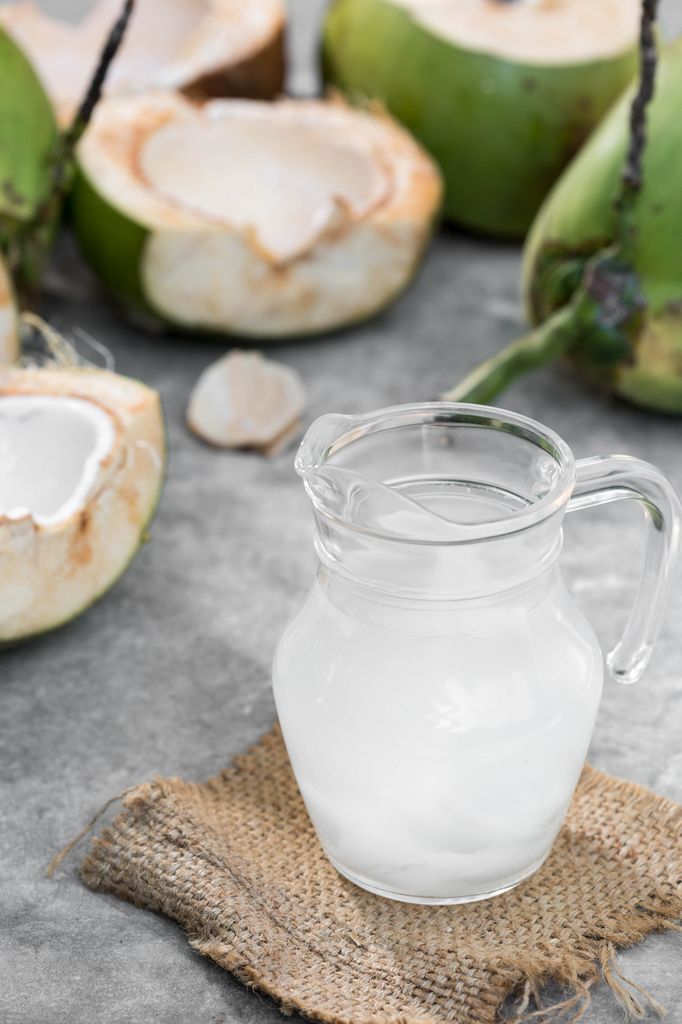Coconut water has become one of the most talked-about drinks in the wellness world. Touted as nature’s sports drink, it’s enjoyed by athletes, health enthusiasts, and busy parents alike. But beyond the marketing hype, what does the science say? As a nutritionist, I’ve seen first-hand how a humble glass of coconut water can support hydration, digestion, and overall wellbeing, when it’s used wisely.
Let’s take a closer look at the real, evidence-backed benefits of coconut water and why it might deserve a place in your daily routine.
A natural source of electrolytes
One of coconut water’s most celebrated properties is its rich electrolyte profile. Unlike sugary sports drinks, coconut water delivers key minerals in their natural form. These include potassium, magnesium, sodium, and calcium, all of which are essential for maintaining fluid balance, nerve function and muscle health. In fact, one cup of coconut water contains more potassium than a medium banana, offering around 600 mg on average.
This makes it particularly helpful after exercise, travel, or during hot weather. If you’ve been unwell or struggling with dehydration, a glass of coconut water can help restore your electrolyte balance gently and effectively.
Lower in sugar than juices or sodas
Compared to soft drinks or fruit juices, coconut water is far lower in sugar and calories. A standard serving contains around 40 to 60 calories and about 8 to 10 grams of natural sugars, significantly less than your average orange juice or cola.
This makes it a better choice when you’re craving something slightly sweet but want to avoid sugar spikes. It’s also a good option for people trying to stabilise blood sugar or reduce their overall carbohydrate intake without sacrificing flavour.
Heart-healthy hydration
Emerging research suggests coconut water may support cardiovascular health. One reason is its high potassium content, which is known to help reduce blood pressure by balancing the effects of sodium. High potassium diets have long been associated with a lower risk of stroke and heart disease.
Some small studies have even found that coconut water can lower levels of LDL cholesterol and triglycerides, while increasing HDL (good) cholesterol, though the changes are modest and should be viewed as supportive, not transformative. Nevertheless, as part of a heart-healthy diet, coconut water may offer an extra layer of benefit.
Soothes the digestive system
Coconut water is naturally gentle on the gut. It contains small amounts of fibre and digestive enzymes, which may help with mild indigestion or bloating. Many of my clients report that when they’re feeling a little off, whether it’s due to stress, diet, or illness, coconut water offers light nourishment without taxing the digestive system.
It’s also useful when recovering from gastrointestinal bugs, especially when the body needs fluids and electrolytes but can’t tolerate heavier foods. Just make sure to choose varieties without added sugar, which can exacerbate digestive issues.
Potential support for kidney and metabolic health
There’s also growing interest in coconut water’s potential to support kidney function. One study published in the journal Biochemical Research International found that coconut water may help prevent the formation of kidney stones by reducing crystal and stone formation in urine.
Although more research is needed, it’s a promising area for people with a history of kidney issues or who want to take preventative steps. Coconut water has also been shown to improve markers of blood sugar control in some animal studies, suggesting potential metabolic benefits, though again, these findings need further human trials before firm conclusions can be drawn.
A natural antioxidant boost
Another reason to reach for coconut water? Its antioxidant content. Coconut water contains compounds that help neutralise free radicals, unstable molecules that can cause oxidative stress and inflammation in the body. These antioxidants may help reduce cellular damage, support healthy ageing, and lower the risk of chronic diseases.
In one study, coconut water was found to reduce oxidative stress markers in rats with liver damage. While animal studies are not directly transferable to humans, they provide a useful foundation for understanding how this natural drink might contribute to long-term health.
But… it’s not a miracle drink
Despite all these benefits, it’s important not to think of coconut water as a cure-all. It should not replace regular water as your main source of hydration, nor should it be consumed in large quantities without considering your overall dietary needs.
If you have chronic kidney disease or are on a potassium-restricted diet, coconut water may not be suitable for you. One or two small glasses per day is typically sufficient for most healthy adults, always choose options without added sugars or flavourings.
How to include it in your day
Post-workout: Sip on coconut water after moderate exercise to replace lost fluids and electrolytes.
Morning refresher: Add a splash of coconut water to your smoothie or drink it on its own as a mid-morning pick-me-up.
Illness recovery: Keep it on hand when you’re under the weather and need gentle hydration.
Mocktail mixer: Mix with lime and mint for a refreshing alternative to sugary mixers.
Faye James is a Sydney-based accredited nutritionist and author of The 10:10 Diet, The Menopause Diet, The Long Life Plan and her latest book The Perimenopause Plan.
Read the full article here









